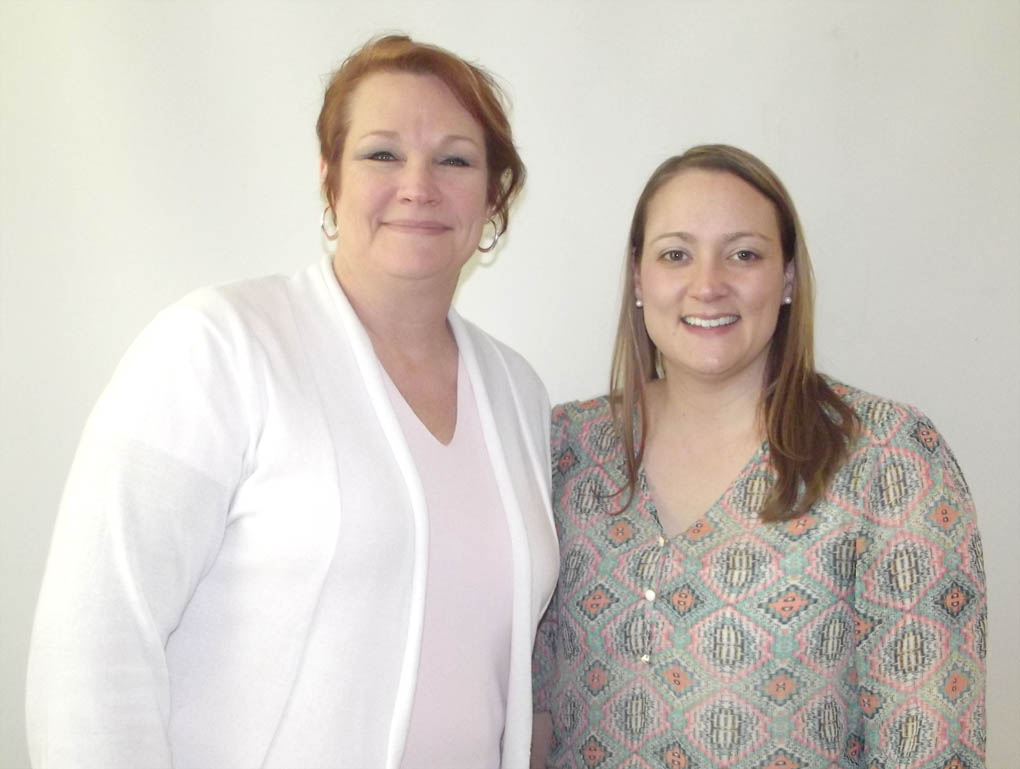College News
CCCC nursing students learn about kidney disease
Notice: This article is older than 12 months. Names, contact information, programs, titles, etc. might have changed. If you have any problems please call the main college number, 1-800-682-8353, and we will be happy to direct you accordingly.

click image to enlarge ⊗
Dr. Casey Migliore (right), who has finished her PhD at the Duke University School of Nursing, recently ... (more)
04.29.2015 • College & Community • College General • Curriculum Programs
SANFORD -- Casey Migliore, who has finished her PhD with the Duke University School of Nursing, recently spoke about kidney disease to Central Carolina Community College second level Associate Degree Nursing students.
"When I teach this lecture, I think it is important to stress to the nursing students how influential kidney function is to the overall health of a patient, and teach them how acute kidney injury affects many body systems and chronic kidney failure affects all body systems," said Dr. Migliore.
"Also, overt symptoms do not usually present until later stages of chronic kidney disease, so patient education and monitoring is key for high-risk patients. Since the number of people affected by kidney disease continues to steadily increase, there is a high likelihood that each student will care for a patient with kidney disease at some point in their career and it is important they understand the disease, especially since kidney disease knowledge is often sub-par at the community level."
Dr. Migliore, who is a former instructor in the CCCC ADN program, believes a lot of people underestimate nurses that work in the area of kidney disease, especially dialysis. "Kidney failure affects all body systems, so we care for patients with various co-morbities and need to be skilled in managing many disease processes. We often have to use quick critical thinking skills and know our patients well, because individualized care is imperative in this setting and there is not always a physician in the building, as in a hospital setting," said Dr. Migliore.
"A typical fluid removal goal for one patient may be impossible for another patient. Also, because we see our patients three times a week on average, we go through life adventures with them. For example, when a patient gets a kidney transplant the excitement in the dialysis unit is overwhelming, which cannot be said for many other areas of nursing."
Dr. Migliore said the prevalence of diabetes in the U.S. has become an epidemic and 90-95 percent of diabetes cases are Type 2 diabetes, which encompasses many modifiable risk factors.
"Therefore, first and foremost, prevention of Type 2 diabetes should be a core component of our health care system. Once diagnosed with Type 2 diabetes, there are various preventative measures to attempt to prevent progression to kidney disease; however, these are often not understood by patients and kidney disease is not discussed in the primary healthcare setting as often as it should be," she said. "This is probably because overt symptoms of the disease often do not present until later stages, although urinalysis can detect early disease. Therefore, frequent monitoring of high-risk patients and education are key to prevent progression to kidney failure, which requires dialysis or transplantation."
Nurses are extremely crucial to the care of patients with kidney disease, said Dr. Migliore. "A lot of nurses tend to veer away from the field of dialysis, which may be due to a lack of understanding, but once you start in this field and see the difference you make with patients, it is contagious and hard to leave," she said.
Dr. Migliore received her BSN from Kent State University in Ohio in 2001. She graduated with a joint MSN/MBA from Duke University's Nursing program in conjunction with Meredith College in 2006. After obtaining her master's degree, she worked in quality improvement in maximum security prison dialysis, was clinical manager of an outpatient hemodialysis clinic, and then taught in the ADN program at CCCC for over two years. In 2010, Dr. Migliore enrolled in Duke University's Nursing PhD program full-time. She received a research grant from the American Nephrology Nurses' Association to conduct her dissertation research. She successfully defended her dissertation titled "Renal Disease Risk Perceptions in African-American Women with Type 2 Diabetes" in March 2015 and has two publications in press from this dissertation.
Dr. Migliore fondly recalls her time at CCCC. "During my time teaching at CCCC, I found my passion was teaching and mentoring nursing students, which sparked me to get my PhD in order to open up many options in this field," she said. "Every year that I return to CCCC as a guest lecturer for this kidney disease lecture, I am continually impressed at the professionalism of the students, the staff, and the overall program. Although many things have changed over the years, the enthusiasm and dedication to the future of nursing is heartwarming."
For more information on the Central Carolina Community College nursing program, visit https://www.cccc.edu/curriculum/
majors/nursing/assoc/, or call Teresa Mangum at 919-718-7313.
Categories
- Admin, Faculty & Staff Category
- Arts & Entertainment Category
- Clubs Category
- College & Community Category
- College General Category
- Continuing Education Category
- Curriculum Programs Category
- Distance Education Programs Category
- Facilities/Buildings Category
- Finances Category
- Foundation Category
- Graduations Category
- Lee Early College Category
- NCCCS Category
- SGA Category
- Special Events Category
- Sports Category
- Students/Graduates Category
- Uncategorized Category
Archives

